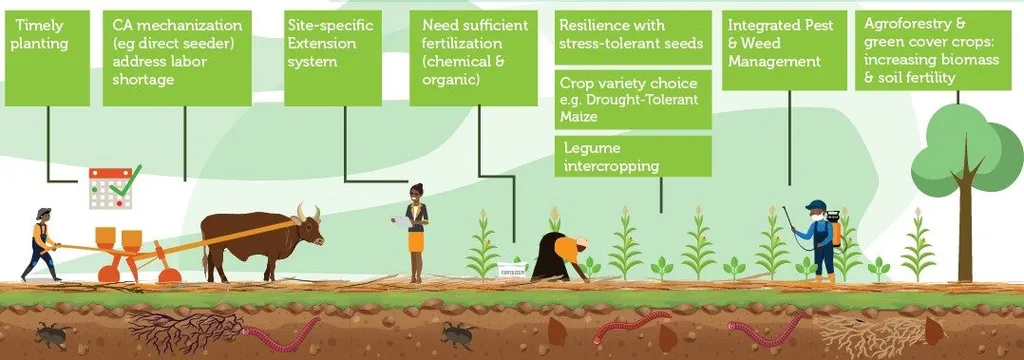In the heart of South Africa, where the rains are becoming increasingly unpredictable and droughts more frequent, smallholder farmers are facing a daunting challenge: how to maintain food production and secure their families’ nutrition in the face of climate change. A recent study published in the journal *Agriculture & Food Security* (translated from Afrikaans as “Landbou en Voedsekerheid”) offers some promising insights, highlighting the potential of climate-smart agricultural practices to improve food and nutrition security for these vulnerable communities.
The research, led by Abiodun Olusola Omotayo from the Food Security and Safety Focus Area Research Group at North-West University, examined the adoption of climate-smart agricultural practices (CSAP) by 320 rural farmers across Limpopo, Mpumalanga, and North-West provinces. The study found that farmers who embraced practices such as soil and water conservation, drought-tolerant crop varieties, minimum or zero tillage, mulching, and crop rotations experienced significant improvements in their food and nutrition security outcomes.
Using an advanced statistical model known as Endogenous Switching Regression (ESR), the study revealed that CSAP adoption enhanced Household Dietary Diversity Scores (HDDS) by 30% and reduced Household Food Insecurity Access Scores (HFIAS) by 35%. These are substantial improvements that can make a real difference in the lives of smallholder farmers and their families.
“Our findings demonstrate that climate-smart agricultural practices are not just theoretical concepts; they are practical solutions that can enhance food security and nutrition for smallholder farmers,” said Omotayo. “By adopting these practices, farmers can better adapt to climate change and improve their resilience.”
The study also identified key factors that influence the adoption of CSAP, including education, access to extension services, and farmers’ perception of drought risk. These findings underscore the need for targeted interventions, such as improved extension services, better access to credit, and climate adaptation programs, to promote the widespread adoption of CSAP.
From a commercial perspective, the energy sector could play a significant role in supporting these efforts. For instance, investing in renewable energy solutions, such as solar-powered irrigation systems, could help farmers adopt water-efficient practices and reduce their reliance on rain-fed agriculture. Additionally, energy companies could collaborate with agricultural stakeholders to develop innovative solutions that promote sustainable agriculture and enhance food security.
The research also has broader implications for achieving the United Nations’ Sustainable Development Goal 2, which aims to end hunger, achieve food security, improve nutrition, and promote sustainable agriculture. By demonstrating the positive impact of CSAP on food and nutrition security, the study provides valuable insights for policymakers and practitioners working towards this goal.
As climate change continues to pose challenges for agriculture and food security, the findings of this study offer a beacon of hope. By embracing climate-smart agricultural practices and investing in supportive interventions, we can help smallholder farmers build resilience, improve their livelihoods, and contribute to a more sustainable and food-secure future.
In the words of Omotayo, “The future of agriculture lies in our ability to adapt to climate change. By working together, we can create a more resilient and sustainable food system for all.”

